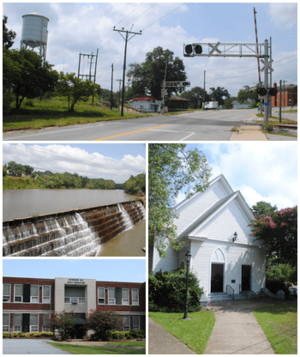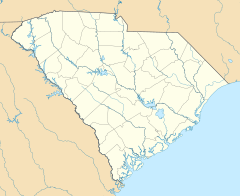Pelzer, South Carolina facts for kids
Quick facts for kids
Pelzer
|
|||
|---|---|---|---|

Top, left to right: South Carolina Highway 8, Saluda River, Pelzer Primary School, Pelzer Presbyterian Church
|
|||
|
|||
| Motto(s):
"Town of Pelzer... A Place to Call Home!"
|
|||
| Country | United States | ||
| State | South Carolina | ||
| County | Anderson | ||
| Area | |||
| • Total | 0.97 sq mi (2.52 km2) | ||
| • Land | 0.91 sq mi (2.37 km2) | ||
| • Water | 0.06 sq mi (0.15 km2) | ||
| Elevation | 742 ft (229 m) | ||
| Population
(2020)
|
|||
| • Total | 1,344 | ||
| • Density | 1,470.46/sq mi (567.81/km2) | ||
| Time zone | UTC-5 (EST) | ||
| • Summer (DST) | UTC-4 (EDT) | ||
| ZIP code |
29669
|
||
| Area codes | 864, 821 | ||
| FIPS code | 45-55465 | ||
| GNIS feature ID | 1231641 | ||
Pelzer is a town located in Anderson County, South Carolina, United States. It sits along the Saluda River. In 2010, the town had a population of 89 people. By 2020, its population grew to 1,344 residents.
Contents
History of Pelzer
Pelzer began in the 1800s as a "mill town." This means it was built around large factories called mills. These mills were owned by the Pelzer Manufacturing Company. They were located on the Saluda River.
The Pelzer Mills
The first mill, called the Lower Mill, was finished in 1882. Later, two more parts were added, known as mills 2 and 3. Construction on the fourth mill, the Upper Mill, started in 1896. These mills used power from two dams on the Saluda River. They were special because they used some of the very first generators ever sold by General Electric. Pelzer's factory was also the first in the country to use electric lights!
The town and company were named after Francis J. Pelzer. He helped find the best spots along the river and planned out the town. Ellison Adger Smyth was the first president of the company for 43 years. He made an important decision when building the fourth mill. Instead of building it right next to the power source, he decided to build it in Pelzer. The power would come from a dam located four miles away. This was a new idea in South Carolina. Many people thought it wouldn't work. However, Smyth worked with General Electric to build the power lines. This was a big step forward for the industry.
All four mills were designed by a company called Lockwood, Greene & Co.. Over time, the Pelzer Manufacturing Company was sold. The mills changed owners several times. The last company to use them was Gerber Products Company. They bought the mills in 1986 and made baby clothes, like Onesies. But in 1990, Gerber stopped making clothes in Pelzer. The mill properties were then bought by Greenlight Enterprises. The Upper Mill was torn down in 2004. The Lower Mill was damaged by fires in 2012 and 2014.
Preserving Pelzer's Past
In 2008, the Community of Pelzer Historical Society was started. Its goal is to save and share the history of Pelzer. This group keeps old records and helps remember important events. Ms. Beth Howansky has been leading this society for many years. Later, in 2013, the Pelzer Heritage Commission bought the land where the mills once stood.
Town Growth
In the early days, the homes of the mill managers were on the town's main street, Lebby Street. This street later became South Carolina Highway 8. When the town first became official, only the main street and nearby areas were included. This allowed the mill management to control the town. However, the mill town itself was much larger than the official town limits. In 2015, people living in the area voted to add much more land to the town's official boundaries.
The Pelzer Presbyterian Church is an important historical building. It was added to the National Register of Historic Places in 1993.
Geography
Pelzer is located in Anderson County, right next to the Saluda River. To the west of Pelzer is the town of West Pelzer. The town of Williamston is about 2 miles (3.2 km) south. Anderson, which is the county seat, is about 17 miles (27 km) to the southwest. The center of Greenville is also about 17 miles (27 km) north.
The town covers a total area of about 0.5 square miles (1.3 sq km). All of this area is land.
Population of Pelzer
| Historical population | |||
|---|---|---|---|
| Census | Pop. | %± | |
| 1950 | 2,692 | — | |
| 1960 | 106 | −96.1% | |
| 1970 | 130 | 22.6% | |
| 1980 | 130 | 0.0% | |
| 1990 | 81 | −37.7% | |
| 2000 | 97 | 19.8% | |
| 2010 | 89 | −8.2% | |
| 2020 | 1,344 | 1,410.1% | |
| 2022 (est.) | 1,379 | 1,449.4% | |
| U.S. Decennial Census | |||
In 2000, there were 97 people living in Pelzer. By 2010, the population was 89. However, the town saw a big increase in population by the 2020 Census, reaching 1,344 people. This shows that more people are choosing to live in Pelzer.
Economy
Pelzer has a few local businesses that help the town's economy.
- Happy Cow Creamery is a farm and creamery located near Pelzer. It uses a Pelzer zip code.
- Mill Town Players is a community theater. It is located on Lebby Street. This theater brings many visitors to Pelzer and is one of the most popular community theaters in South Carolina.
Notable People
- Junior Wooten, a professional baseball player.
- Shoeless Joe Jackson, another professional baseball player. He lived in Pelzer when he was a child and played for the mill's baseball team for a short time.
- William L. McKittrick, a Marine Aviator during World War II. He became a Major General.
- Mac Arnold, a famous local blues musician. He was born nearby and now lives in Pelzer.
Images for kids
See also
 In Spanish: Pelzer para niños
In Spanish: Pelzer para niños






